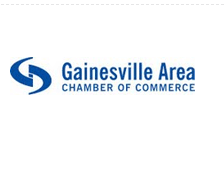
– Gainesville Area Chamber of Commerce
The Gainesville Area Chamber of Commerce announced that it has joined the Business for Federal Research Funding coalition, a group of over 40 chambers of commerce nationwide to advocate for strong research funding growth in the federal budget. This partnership will help support innovation and economic growth efforts, both in the Gainesville region and across the country.
business for federal research funding logo“We are in an increasingly competitive global marketplace, and federal investment in innovation is critical to promoting economic growth in the United States,” said Tim Giuliani, President & CEO of the Gainesville Chamber. “Increasing federal research funding will strengthen our national economy and improve America’s competitive position on the world stage.”
The Gainesville Chamber has joined this coalition as a next step following the Chamber’s Washington, DC visit earlier this month, where increased federal research funding was a key agenda item raised with Congressional delegation members.
Federal policy advocacy supporting the Gainesville regional innovation economy was an action item identified by the Chamber’s Innovation Policy Group, launched in February 2014. The Chamber is committed to promoting a policy agenda advancing its vision of the Gainesville region being the global hub for talent, innovation, and opportunity.
The FY’15 federal budget appropriations process is now underway. Beginning with this process, the coalition will argue that federal accounts which are responsible for dispersing research funds should receive funding increases. These increases should be at a steady rate above inflation each year.
On April 29, the coalition will call upon the U.S. Senate Committee on Appropriations to support increased funding during its hearing on “Driving Innovation Through Federal Investments.” As part of its Testimony for the Record, the coalition will “encourage the Committee to increase federal accounts responsible for dispersing research funds at a steady rate above inflation each year beginning with the fiscal year (FY) 2015 appropriations process.” Click here to view the full testimony submitted to the U.S. Senate Committee on Appropriations.
“The Gainesville region is home to the University of Florida (UF), one of the preeminent and largest research universities in the nation. With our regional economy replete with success stories emanating from university commercialization, we highly endorse increased research funding in the federal budget beginning with fiscal year 2015,” said Giuliani. “As a regional chamber in the now third largest state in America, we stand ready to provide examples, both in person and via electronic means, to the U.S. House, the U.S. Senate and the Administration to underscore the value federal innovation dollars have played in our innovation economy in the heart of Florida.”
The federal government has played a major role in funding research efforts that have led to significant scientific breakthroughs and new technologies, from the Internet to communications satellites and defenses against disease. Nearly 60 percent of funding for basic scientific research in the United States is provided by the federal government. Innovations that flow from university-based basic research are at the root of countless companies, products, technologies, innovations and jobs.
The Business for Federal Research Funding coalition represents a strong cross-section of the nation’s business community, with broad geographic diversity among its members. Coalition members seek to bring increased focus on the critical impact that federal research dollars have on the long-term growth prospects of the nation’s economy.
The chambers who make up Business for Federal Research Funding will engage in lobbying and advocacy efforts with members of Congress and the Administration; use communications activities to raise awareness among key business and government stakeholders, and the general public; and coordinate strategy to maximize the collective impact of efforts to increase federal research funding.




